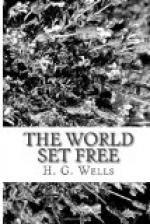A recent historical writer has described the world of that time as one that ’believed in established words and was invincibly blind to the obvious in things.’ Certainly it seems now that nothing could have been more obvious to the people of the earlier twentieth century than the rapidity with which war was becoming impossible. And as certainly they did not see it. They did not see it until the atomic bombs burst in their fumbling hands. Yet the broad facts must have glared upon any intelligent mind. All through the nineteenth and twentieth centuries the amount of energy that men were able to command was continually increasing. Applied to warfare that meant that the power to inflict a blow, the power to destroy, was continually increasing. There was no increase whatever in the ability to escape. Every sort of passive defence, armour, fortifications, and so forth, was being outmastered by this tremendous increase on the destructive side. Destruction was becoming so facile that any little body of malcontents could use it; it was revolutionising the problems of police and internal rule. Before the last war began it was a matter of common knowledge that a man could carry about in a handbag an amount of latent energy sufficient to wreck half a city. These facts were before the minds of everybody; the children in the streets knew them. And yet the world still, as the Americans used to phrase it, ‘fooled around’ with the paraphernalia and pretensions of war.
It is only by realising this profound, this fantastic divorce between the scientific and intellectual movement on the one hand, and the world of the lawyer-politician on the other, that the men of a later time can hope to understand this preposterous state of affairs. Social organisation was still in the barbaric stage. There were already great numbers of actively intelligent men and much private and commercial civilisation, but the community, as a whole, was aimless, untrained and unorganised to the pitch of imbecility. Collective civilisation, the ‘Modern State,’ was still in the womb of the future....
Section 6
But let us return to Frederick Barnet’s Wander Jahre and its account of the experiences of a common man during the war time. While these terrific disclosures of scientific possibility were happening in Paris and Berlin, Barnet and his company were industriously entrenching themselves in Belgian Luxembourg.
He tells of the mobilisation and of his summer day’s journey through the north of France and the Ardennes in a few vivid phrases. The country was browned by a warm summer, the trees a little touched with autumnal colour, and the wheat already golden. When they stopped for an hour at Hirson, men and women with tricolour badges upon the platform distributed cakes and glasses of beer to the thirsty soldiers, and there was much cheerfulness. ‘Such good, cool beer it was,’ he wrote. ’I had had nothing to eat nor drink since Epsom.’




